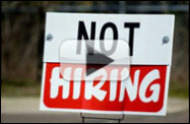Long-term unemployment affects more than just finances, according to a new study by the Pew Research Center.
The report, "The Impact of Long-term Unemployment Lost Income, Lost Friends--and Loss of Self-respect," finds that compared to those who faced short-term unemployment, people out of work for extended periods of time more often lost family income, contact with close friends, self-respect and good family relations.

Interactive Tutorial: Unemployment
The economy, including unemployment, is one of12 issue areas in development for a planned State of the USA website focused on key national indicators. Here are the Pew study's key findings, according to the report:
- A majority of the long-term unemployed (56 percent) say their family income has declined during the recession, compared with 42 percent who were out of work less than three months and 26 percent of adults who have not been unemployed since the recession began in December 2007. Overall, the long-term unemployed are also more likely to say they are in worse shape financially now than before the recession.
- Nearly half (46 percent) of those unemployed six months or more say joblessness has strained family relations, compared with 39 percent of those who were out of work for less than three months. At the same time, more than four-in-ten (43 percent) long-term unemployed say they lost contact with close friends.
- Nearly four-in-ten (38 percent) long-term unemployed report they have lost some self-respect while out of work, compared with 29 percent who were jobless for shorter periods of time. The long-term unemployed also are significantly more likely to say they sought professional help for depression or other emotional issues while out of work (24 percent vs. 10 percent for those unemployed less than three months).
- More than four-in-ten (43 percent) of the long-term unemployed say the recession will have a ―big impact on their ability to achieve their long-term career goals. Among those unemployed less than three months, 28 percent said being jobless would have a similarly serious impact.
- More than seven- in 10 long-term unemployed say they changed their careers or job fields or seriously thought about doing so. They also were more likely to pursue job retraining programs or other educational opportunities while out of work.
- Among workers who found a job after being unemployed for six months or longer, about three-in-ten (29 percent) say their new job is worse than the one they lost, compared with only 16 percent of re-employed workers who had been jobless for less than six months. In separate questions, these workers also report their new job paid less and had worse benefits than their old one.
- Among adults who are currently unemployed, those who have been jobless for six months or longer are significantly more pessimistic than the short-term unemployed about their chances of finding a job as good as the one they lost.
Take a closer look at long-term unemployment data from 1970 to 2010 with this State of the USA interactive graph.
(Pew Research Center: "The Impact of Long-Term Unemployment")
Suzette Lohmeyer is a staff writer and producer for State of the USA.